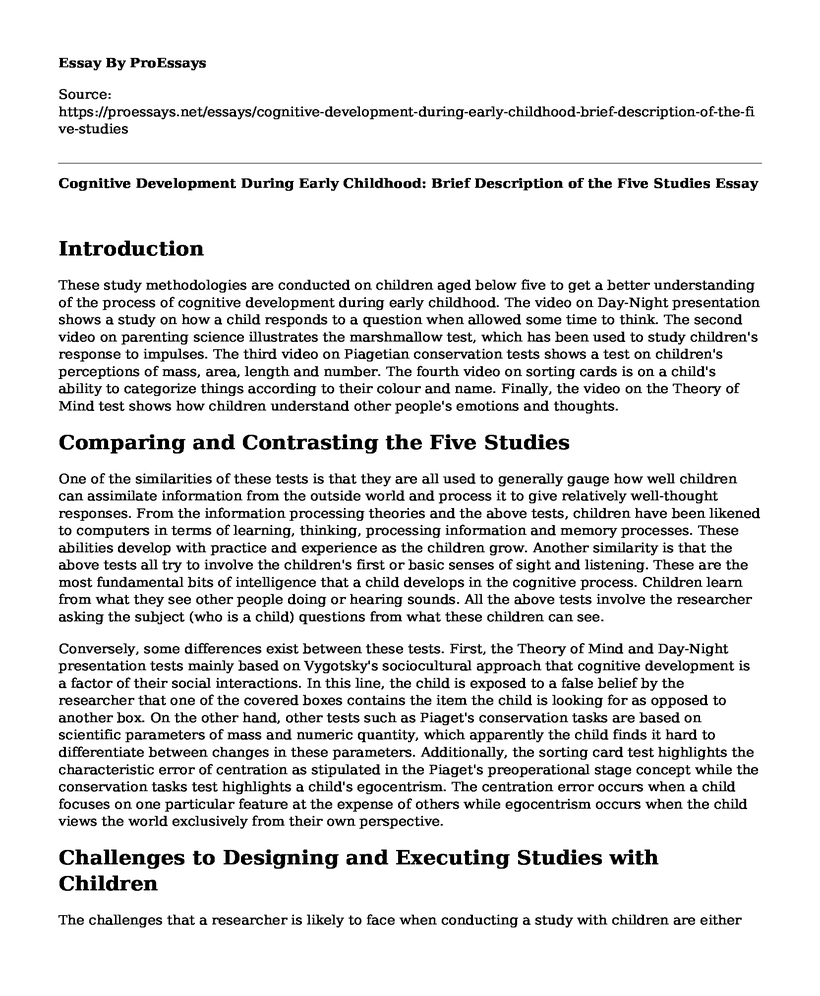Introduction
These study methodologies are conducted on children aged below five to get a better understanding of the process of cognitive development during early childhood. The video on Day-Night presentation shows a study on how a child responds to a question when allowed some time to think. The second video on parenting science illustrates the marshmallow test, which has been used to study children's response to impulses. The third video on Piagetian conservation tests shows a test on children's perceptions of mass, area, length and number. The fourth video on sorting cards is on a child's ability to categorize things according to their colour and name. Finally, the video on the Theory of Mind test shows how children understand other people's emotions and thoughts.
Comparing and Contrasting the Five Studies
One of the similarities of these tests is that they are all used to generally gauge how well children can assimilate information from the outside world and process it to give relatively well-thought responses. From the information processing theories and the above tests, children have been likened to computers in terms of learning, thinking, processing information and memory processes. These abilities develop with practice and experience as the children grow. Another similarity is that the above tests all try to involve the children's first or basic senses of sight and listening. These are the most fundamental bits of intelligence that a child develops in the cognitive process. Children learn from what they see other people doing or hearing sounds. All the above tests involve the researcher asking the subject (who is a child) questions from what these children can see.
Conversely, some differences exist between these tests. First, the Theory of Mind and Day-Night presentation tests mainly based on Vygotsky's sociocultural approach that cognitive development is a factor of their social interactions. In this line, the child is exposed to a false belief by the researcher that one of the covered boxes contains the item the child is looking for as opposed to another box. On the other hand, other tests such as Piaget's conservation tasks are based on scientific parameters of mass and numeric quantity, which apparently the child finds it hard to differentiate between changes in these parameters. Additionally, the sorting card test highlights the characteristic error of centration as stipulated in the Piaget's preoperational stage concept while the conservation tasks test highlights a child's egocentrism. The centration error occurs when a child focuses on one particular feature at the expense of others while egocentrism occurs when the child views the world exclusively from their own perspective.
Challenges to Designing and Executing Studies with Children
The challenges that a researcher is likely to face when conducting a study with children are either methodological or ethical. With regards to the methodological challenges, studies of the cognitive development processes are mainly limited to qualitative research designs. Children cannot be given questionnaires in a bid to study their behaviours. Therefore, the researcher is prompted to use interviews or one on one conversation with the child. Additionally, since the child's brain cannot comprehend abstract details, the researcher is confined to using pictorial representations of objects or a symbolic language that the child can understand. On the ethical challenges, a close relationship between the researcher and participants is an important aspect of any qualitative research. In this case, however, it may be difficult for the researcher to establish a close connection with the child due to the intricacies that arise due to unequal power relationships with the children. Finally, the child may not recognize that he or she is participating in a study and, therefore, the researcher should be highly informed about child behaviour to get what is expected from the child.
Cite this page
Cognitive Development During Early Childhood: Brief Description of the Five Studies. (2022, Apr 04). Retrieved from https://proessays.net/essays/cognitive-development-during-early-childhood-brief-description-of-the-five-studies
If you are the original author of this essay and no longer wish to have it published on the ProEssays website, please click below to request its removal:
- Essay on Social Media Effects on the Society
- Music: Enhancing Lives and Educations of Students - Essay Sample
- Essay Example on Maximise Learning & Academic Achievement: Impact of Student's Dominant Learning Style
- Essay Example on Video Recording for Professional Development
- Research Paper on Combining Academic Goals and Community Service for Learning
- Paper Example on Survey: Master My Stories & Describe the Gap: Accountability & Overcoming Challenges
- Reconsidering the Electoral College: Challenges to Democracy and Calls for Reform - Essay Sample







